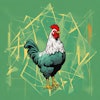A number of recent reports on government initiatives and press releases by activists opposed to intensive animal production are individually irritating but taken as a whole appear threatening. Some of the issues which have emerged since the advent of the new administration are clearly aimed at the most productive components of agriculture and appear to favor some idyllic pre-depression, family-farm mindset.
The new administrator of the Grain Inspection, Packers and Stockyards Administration has indicated his intention to clarify the relevant sections of the Packers and Stockyard Act dealing with the principles of unfair, unjustly discriminatory and undue unreasonable preference or advantage to any person or geographic locality. This approach may relate to the current concerns of consolidation in the red meat industry and the traditional practices which are followed. It could also apply to the relationship between integrators and contractors producing broilers following industry cutbacks resulting in the inevitable retrenchment of growers.
An organization termed the Campaign for Family Farms and the Environment has demanded suspension of Farm Service Agency direct and guaranteed loans for hog and poultry facilities. These loans are in fact intended to make it possible for individual families to participate in the efficient production of hogs and poultry. Restricting loans for new and more efficient housing will prevent entry of farmers into the production chain. Output will be limited and job opportunities in processing plants, feed mills and the allied industries will be lost. Consumers will inevitably pay more for their products and our competitive export situation will be sacrificed.
Who are the family farm organizations such as Iowa Citizens for Community Improvement, Missouri Rural Crisis Center and the Land Stewardship Project of Minnesota? Certainly there is over-production at times but by the same token there is under-production consistent with the business and reproductive cycles of hogs, poultry and cattle. In our economy the marketplace should decide on volumes which should be produced and who will generate a profit. Laws which limit cartels and collusion have been enacted to promote free enterprise. We are emerging from a severe recession during which consumption of all meat products has been severely depressed both domestically and in the international markets. The current situation is transitory, as any student of agricultural economics will recognize. Some industries show greater amplitude in the peaks and troughs of their revenue. The broiler industry which is characterized by integration, consolidation and maturity has greater stability than hogs, beef or eggs.
Diversion of corn to ethanol promoted by this and the previous administration has been a major factor contributing to the most recent period of losses, to the disadvantage of all consumers and taxpayers with no appreciable benefit in terms of the environment or establishing energy independence. The convoluted trade policies of the U.S. government have also impacted the stability of the broiler industry where grower layoffs have occurred.
The unjust and scientifically invalid changes proposed for organic certification under the National Organic Program administered by the USDA are directed against large-scale and corporate production of organic eggs and broilers. If the new requirements for outside access are adopted, companies which have invested millions of dollars in in-line aviary facilities will be forced to abandon organic production. This in turn will reduce the availability of product to the larger supermarket chains and result in a marked escalation in the price of products. There will be an inevitable contraction in the market for organic poultry and eggs, as the market will degenerate into a small group of affluent purchasers obtaining their requirements from boutique food stores.
Increasing pressure on farmers to conform to EPA rules on greenhouse gas emissions will seriously impact operations with over 750,000 hens. It is noted that the standard egg complex exceeds one million hens, which offer economies of scale which are passed directly to the consumer in a competitive market. If our current hen population of 275 million is spread among numerous smaller producers, the quantum of greenhouse gases released will in fact increase, especially if producers are forced to adopted archaic non-confined and free-range systems.
On balance the intensive animal industry which has contributed to our economy and our food supply appears to be under siege. The cadre of undersecretaries and their subordinates appointed by the new administration appear to be exceedingly deficient in their individual and collective knowledge of agriculture. They bring to their positions histories of activism in environmental, social, labor and political issues and legal experience but have never collected eggs, milked a cow, reared an animal or driven a tractor.
Less than 2% of our population produces food for the remainder of the nation and export. This could not have happened without intensification and industrialization. Now is not the time to turn back the clock. If inequalities or exploitation exist, undesirable practices should be constrained. Blaming intensive agriculture for the problems which have arisen from a world recession will be counterproductive. Washington should not attempt to impose restraints on intensive agriculture. The events of 1917 extending to the present demonstrate the futility of central planning and government interference. Russian agriculture suffered adversely from the effects of "bad weather" for over 70 years. China underwent major famines until collectivism was abandoned.


















